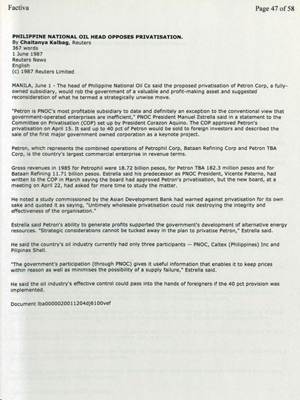PHILIPPINE NATIONAL OIL HEAD OPPOSES PRIVATISATION
[Reuters]
Published date: 1st Jun 1987
1 June 1987
Reuters News
English
(c) 1987 Reuters Limited
MANILA, June 1 – The head of Philippine National Oil Co said the proposed privatisation of Petron Corp, a fully owned subsidiary, would rob the government of a valuable and profit-making asset and suggested reconsideration of what he termed a strategically unwise move.
“Petron is PNOC’s most profitable subsidiary to date and definitely an exception to the conventional view that government-operated enterprises are inefficient,” PNOC President Manuel Estrella said in a statement to the Committee on Privatisation (COP) set up by President Corazon Aquino. The COP approved Petron’s privatisation on April 15. It said up to 40 pct of Petron would be sold to foreign investors and described the sale of the first major government owned corporation as a keynote project.
Petron, which represents the combined operations of Petrophil Corp, Bataan Refining Corp and Petron TBA Corp, is the country’s largest commercial enterprise in revenue terms.
Gross revenues in 1985 for Petrophil were 18.72 billion pesos, for Petron TBA 182.3 million pesos and for Bataan Refining 11. 71 billion pesos. Estrella said his predecessor as PNOC President, Vicente Paterno, had written to the COP in March saying the board had approved Petron’s privatisation, but the new board, at a meeting on April 22, had asked for more time to study the matter.
He noted a study commissioned by the Asian Development Bank had warned against privatisation for its own sake and quoted it as saying, “Untimely wholesale privatisation could risk destroying the integrity and effectiveness of the organisation.”
Estrella said Petron’s ability to generate profits supported the government’s development of alternative energy resources. “Strategic considerations cannot be tucked away in the plan to privatise Petron,” Estrella said.
He said the country’s oil industry currently had only three participants — PNOC, Caltex (Philippines) Inc and Pilipinas Shell.
“The government’s participation (through PNOC) gives it useful information that enables it to keep prices within reason as well as minimises the possibility of a supply failure,” Estrella said.
He said the oil industry’s effective control could pass into the hands of foreigners if the 40 pct provision was implemented.






